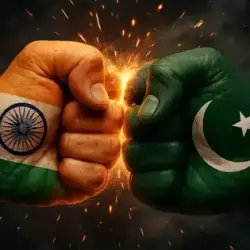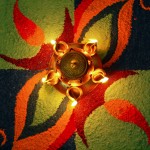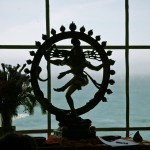Protection can never be of a being or a person, for that which is sure to die can never be saved.. even by the Divine. Aspiration can only be to protect the Divine from the Divine’s. Mata Gujri and her two grandsons had died in custody of Wazir Khan – who was pursuing and attacking Guru Gobind Singh’s Sikhs. At that time, the Guru turned to his Guru, the Formless, Stainless and Self-reliant. Primal, Blemish-less, Endless and birth-less. That which was the manifestation as Brahm, Vishnu and also Shiva, the Adi Yogi.
The fight from the beginning of time has been between Dharma and A-Dharma, between the Being and the Becoming. The primal conflict – that distance between What is and What should be – is the only source and manifestation of Violence in Creation. Its absence is A-himsa. To realize the moment and be able to live in it as fully as one can is living in Dharma. If that moment calls for wielding the sword, then so be it. Whether that Sword is of Vivek – the Discrimination between what is the “Me” (the Eternal Me) and what is “Mine” or the physical one that defends the Dharmic is a semantic difference.
jai asidhuj tav sarni parai
Lord of Sword, or the One Consciousness, the Primal and Timeless Purush (being) is at the same time, the goal and the sword by which that distinction of Me and Mine can be cut through!
Words are limited and expressions are of the moment in which they originate, the understanding of it however is at the level of the listener. Your teacher might be a Nobel Prize winner, but if you are in grade 10th, you will only get which you can make sense of what he says .
Understanding, therefore, has nothing to do with the Teacher or the Guru but the Student. Sikh, the student or learner, can only learn what he makes himself capable of, Guru’s presence or not is immaterial. That is why, perhaps, the last Guru who had taken his own Guru as the Primal Non-Being, surmised that if the student can, then the written word of Guru is enough. However, if,the seeker lacks the intellect born of humility, then even the live Guru himself can do a Sikh like Bhag Singh no favor. Guru is what the Sikh, a student, makes of him. He is no more and no less.
Two prayers:
ਦੇਹ ਸਿਵਾ ਬਰੁ ਮੋਹਿ ਇਹੈ ਸੁਭ ਕਰਮਨ ਤੇ ਕਬਹੂੰ ਨ ਟਰੋਂ ॥
(देह शिवा बर मोहे ईहे, शुभ कर्मन ते कभुं न टरूं / O Lord Shiva grant me the boon, that I may never deviate from doing a good deed)
and
ਤਾਕੌ ਕਰਿ ਪਾਹਨ ਅਨੁਮਾਨਤ ॥ ਮਹਾਂ ਮੂੜ੍ਹ ਕਛੁ ਭੇਦ ਨ ਜਾਨਤ | ਮਹਾਂਦੇਵ ਕੌ ਕਹਤ ਸਦਾ ਸ਼ਿਵ ॥ ਨਿਰੰਕਾਰ ਕਾ ਚੀਨਤ ਨਹਿ ਭਿਵ ॥੩੯੨॥
(The fool considers Him a stone, for he does not know the Profound Mystery that is God. He calls Shiva, The Eternal Lord, and does not know the secret of the Formless Lord)
The one who prays to Shiva, also calls those who reduce the Eternal Shiva to a “name” and a form with as much expanse as their own limits may allow, as fools. It is no contradiction. Shiva in the hands of the Guru transcends all limits and is the Eternal.. the Unmanifest! In the hands of a lesser mind, it remains no more than a stone. So, the seeming contradiction. Guru is, what the Sikh can be.
In the movie Avatar, as the Nav’i forest is attacked by the humans, Jake Sully bows to Eywa in the forest with the roots and branches of Eternal Intelligence and prays to the formless Goddess to save Pandora and the Nav’is. As he gets up and turns around, Neytiri informs him “Eywa never favors, for she is always in balance”.
One can Balance only that, which he has power to Balance and is its own. That which is external and outside of one can never be Balanced. So, that which inherently is not in “your favor” or “against the other”, then what do you pray to it for and why?
When the seeker is one with the prayed to and realizes that the prayer, the prayed and the reward are non-different from the seeker himself; then the words have no meaning. At least not the one they seem to suggest.
The Guru’s prayers are probably the silent and personal prayers of Neytiri (if they were shown) for her “well being” knowing fully well Eywa doesn’t favor. When the hope of bias and prejudice from the Divine is lost and understood, and still prayer comes forth, then it is truly Divine.
ਦੁਸ਼ਟ ਜਿਤੇ ਉਠਵਤ ਉਤਪਾਤਾ ॥ ਸਕਲ ਮਲੇਛ ਕਰੋ ਰਣ ਘਾਤਾ ॥੩੯੬
dust jitai oothvat ootpata skal mlaich kro run ghata
(All the evil doers who arise (in my mind), fight with them and destroy them there and then. – translation from Wikipedia)
Mlechh (or Mlaichh) – has been a word in Vedas to describe that which is against the Dharmic or A-Dharmic. (Dharma is also called Hukum by Guru Nanak.) In various societies and times in history, the word was used by people to define their enemies by ascribing one’s own actions as Dharma.
Mlechh, as A-dharmic – is no more than the distance between the Being and the Becoming. It is the conflict created as a result. To fight and kill the A-dharmic on the battlefield is not a call for bloodshed but a call for the Dharmic.
Prayer to slay Mlechh is the call to restore balance, and as the Guru experienced and Neytiri cried on hers “Eywa has listened!” She does. Not in the way you might think however.
References:















